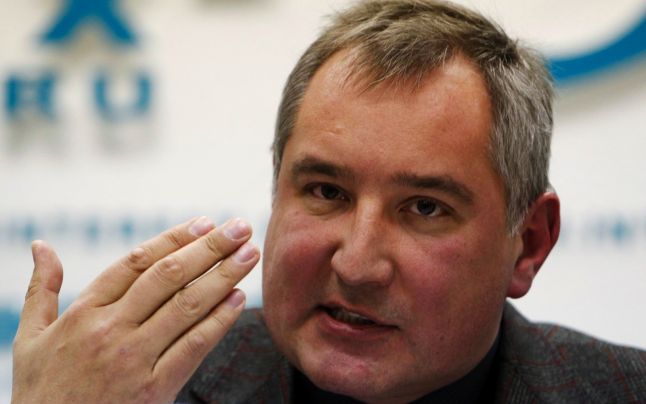
Russia Places Moldova in an Energy and Sovereignty Vise
Publication: Eurasia Daily Monitor Volume: 10 Issue: 12
By:

Since Transnistria elected a new “president” on December 11, 2011, Russia has been trying to tighten its controls over this province, which was carved out of Moldova and is sustained by a force of Russian troops. Over the past year, Moscow has declared its intention to establish a consulate in Transnistria—which would in essence create another pseudo-recognized government—institute a permanent mechanism of Russian control over the breakaway region, and irrevocably detach the province from Moldova.
In October 2012, Sergei Gubarev, ambassador-at-large in the Russian Ministry of Foreign Affairs, openly stated that Moscow may actually consider recognizing Transnistria as an independent state (RIA Novosti, October 13, 2012). Indeed, Moscow’s concurrent attempts to open Russian consulates in Transnistria had already created tensions with Chisinau. The Moldovan government contends that the presence of such Russian consulates in the breakaway territory without Moldova’s permission would essentially bestow recognition of statehood on Transnistria (see EDM, November 15, 2012).
In exchange for allowing the Kremlin to open consulates in its breakaway territory, Moldova demands that Russia withdraw its troops from Transnistria where they support the local government (Infotag, November 16, 2012). Yet apparently, in advance of Organization for Security and Cooperation in Europe (OSCE)-led 5+2 negotiations in Dublin, Russia sent more weapons to Transnistria (Publika Online, November 28, 2012). A Polish paper reported as well that intelligence cooperation between Russian and Transnistrian intelligence has increased (Dziennik Gazeta Prawna, November 27, 2012).
Tensions in Moscow-Chisinau relations have extended further over the past year. Earlier in 2012, Moldova angered the Kremlin by joining the US-led Global Peace Initiative, a security assistance program under which Washington supports other countries’ peacekeeping capabilities. Moreover, Moldova has also indicated its desire to participate in European Security and Defense Policy projects (see EDM, October 25, 2012).
Finally, Russia argues—falsely—that Moldova’s government owes debts to the private Russo-Moldovan joint-stock gas company Moldovagaz, which operates on both sides of the Dniester River (Infotag, November 19, 2012). In November, Deputy Prime Minister Dmitry Rogozin, Moscow’s point-man on Transnistria, demanded that Moldova pay Transnistria’s gas debts as well. Rogozin also threateningly announced that he sees no settlement prospects for the Transnistria conflict or dialogue with Moldova due to a “massive psychological attack from international observers [the European Union and the United States] and organizations.” In other words, Rogozin implies that if the US and EU continue to support Moldova’s claims to its territorial integrity through political and diplomatic means, Moscow will maintain its support for the government in Transnistria and continue to infringe on Moldova’s sovereignty and integrity (Kommersant.md, November 19, 2012).
These Russian actions harmful to Moldova’s interests are likely to be in retaliation for Chisinau’s refusal to renounce its geopolitical choice to orient itself toward the West and the European Union as well as its adoption of the EU’s second and third energy packages, which prevent foreign gas suppliers from also being distributors in the same country (Infotag, November 19, 2012). Moreover, Moscow’s diplomatic reprisals also appear to be in response to Moldovan President Nicolae Timofti’s demand for Russia’s unconditional pullout from Transnistria (Interfax-AVN Online, October 4, 2012; Infotag, November 19, 2012).
Because Moldova would not renounce the second and third energy packages, Rogozin cancelled his scheduled trip to Moldova and thus prevented a new bilateral gas agreement with Russia (Adevarul Moldova Online, November 16, 2012). Nevertheless, Moscow has hinted it would offer Moldova a 30-percent discount on the price of natural gas if Chisinau renounces the EU energy packages and allows Russia to dominate the Moldovan gas market (Infotag, November 20, 2012).
Therefore, while continually threatening to try and irrevocably detach Transnistria from Moldova, Russia is at the same time using the threat of gas supply disruptions to bring Moldova to heel. Moscow habitually uses these tactics of disrupting gas supplies throughout the former Communist bloc. But increasingly, their frequent utilization in the Balkans reflects the Kremlin’s anxiety that—due to the EU energy packages coming into force—Russia may not be able to secure an exclusive or at least hegemonic position in these states’ gas supply and distribution networks. The recent start to construction of the South Stream pipeline in December 2012 reflects Moscow’s grand ambition to be the dominant if not sole supplier of natural gas to Southeastern Europe. And it can only enforce compliance upon dependent consumers in the Balkans—just as in Moldova—by threatening that if they do not accept Russian terms, negative consequences, such as disruptions in the gas supply, will take place. Since Russia still cannot compete economically with the EU in the Balkans other than in the energy sphere, the threat of such disruptions remains its most effective weapon to induce acquiescence. Therefore Russia attempts to use its energy power for all it is worthwhile. Europe, on the other hand, seems unable to grasp the import or consequences of Russia’s pipeline politics. Certainly the absence of reporting in the West about these trends in the Balkans suggests a lack of interest. But as European Council on Foreign Relations analyst Dimitar Bechev has recently suggested, the Balkans are increasingly becoming the center of the geopolitical struggle between East and West. Only this struggle is now primarily waged with pipelines and gas deals, not tanks.




